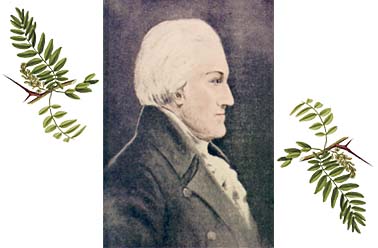
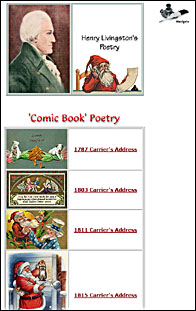
|
VARIOUS WAYS OF LEARNING ABOUT HENRY:
Books
Who Wrote 'The Night Before Christmas':
Softcover
Kindle
Henry Livingston, Jr., The Christmas Poet You Always Loved: Kindle Edition:
The Night Before Christmas:
Softcover
Kindle
Thrice Happy Poetry:
Softcover
Kindle
A Century of Arguments
Historical
Chronological
Slideshow
quick and easy; lots of pictures
The Christmas Poem Story in Anapest
Timelines
Of Authorship Issues
Real Nitty-Gritty Of Henry's Day to Day Life
Henry's Poetry
All Henry's Poetry
All Henry's Poetry by Source
Henry's handwritten book of poetry
Daughter Jane's handwritten book of poetry
1791 New York Magazine Publication
New Year Carrier Addresses
Graphic Novel Poetry
Illustrated Minibooks
This Website
around 10,000 separate pages - Site Map
An Overview Around the Original 1823 Poem
|
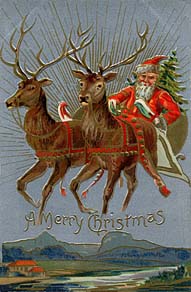
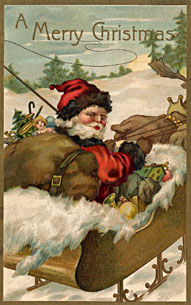
|
OTHER IMPORTANT PAGES:
Don Foster's 'Author Unknown'
All Moore's Poetry
FIRST EVER!!! Moore's Handwritten Manuscript
Mac Jackson's Statistical Analysis
Smoking Gun?
1823 Troy Sentinel
1830 Troy Sentinel
1844 'Poems'
Reindeer Names
First Use of 'Happy Christmas' Phrase, 1773
Chronological Witness Letters
2003 Exhibit, Lectures, Booklet and Placemat
A Moving Collage of Images
The Man
About Henry
Locust Grove, the Home of Henry
Walk Thru Locust Grove
Prominent Family Connections
Timeline Summary of the Christmas Poem story
Publicity
Mac in NZ
NY Times and People Magazine
Troy NY Calls It for Henry
Troy NY Henry Day
Henry's Music Manuscript
Listen to: The Duenna 'Farewell to Lochaber'
'Yanky Doodle'
Listen to The Duenna:
'Birks of Envermay'
'When Sable Night'
Vintage Books of Night Before Christmas
Vintage Santa Postcards
|

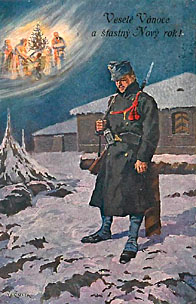

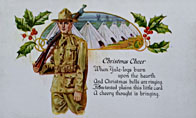

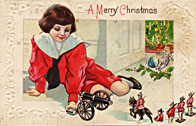

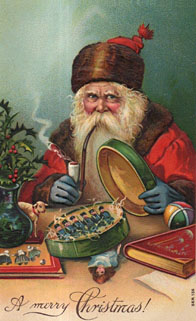

|
MAJOR VAN DEUSEN BROUGHT ME TO MAJOR LIVINGSTON:
I would never have found Major Henry Livingston if I'd not been searching for Major Bradley Van Deusen. Mother left father when I
was 6 weeks old, and all I knew of him was that he was a soldier and a poet, and had died while I was still a child. I was desperate to know him, this man who
created half of me, and I thought that in his poetry I'd find HIM. I did have letters father had
written begging mother to come back and, in them,
he said that he'd burned his manuscripts and the future could do without him.
Well, not if his daughter had anything to do about it.
But I couldn't find his poems and it seemed as though his future was, indeed, lost. Then I thought that if, perhaps, I took up genealogy, I could find a relative with a book.
And that search led me to Henry - another major who was a poet. Henry, like father, seemed lost to the future. Whether he will be or not is for you to determine.
And if there are karmic rewards, then I believe I've gotten one. I found father's poetry.
And much of it touches me deeply. More than just his words, I found the poetry column of his in which he courted my mother, and I found
one of his books. I believe I know father now and if
you'll help by reading him, maybe the future WON'T have to do without him.
Outcast men of the world are we,
Sunk in the depths of iniquity
Detested by all and loved by none.
A blot on the face of the kindly sun.
Men of training and breeding and birth
Who knew full well what the game was worth
Who played their hands -- and lost --
-- and then
Lost themselves from the world of men.
We hid ourselves in the Island world
Where the flashing coils of the "Snake" are curled
We sought the depths to hide our shame.
The "thing" we had made of an honored name.
We swam the Bay in the early dawn
But the Shark came not, and we lived on.
We sought the end in the bolo's steel
But hearts wounds live, while flesh wounds heal.
We went unarmed to the Moro's "jil"
But they called us "mad" and they would not kill.
And the Padre came with his tale of Grace
But we knew better, and laughed in his face.
We twined our hearts in a woman's hair
Then tried to forget in the din and glare
Of a "tienda down on the opal bay
Where many men come and some men stay.
We lost ourselves in the Army then,
Our identity merely "Enlisted Men"
But in the dusk, when the shadows start to crawl
In their weird, wild dance on the barracks wall
A ghastly pageant that comes to stir
Our memory again to what we were
And we bow our heads and stifle a cry
For we don't know how and we'll never know why.
|

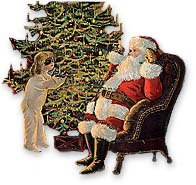

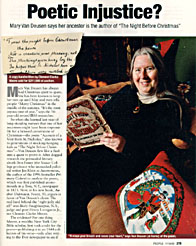
Mary Van Deusen

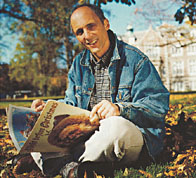
Don Foster

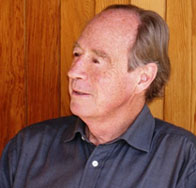
Mac Jackson
|
NIGHT BEFORE CHRISTMAS:
15 years before the famous Christmas poem ever saw the
light of a Troy day, Henry Livingston's children heard their father recite it to the family as his own composition. His sons Charles, Sidney and Edwin and
the next door neighbor girl Charles married, Eliza, all remembered Henry coming out from his writing den under the staircase
and reading them that never-to-be-forgotten poem. But most of Henry's poems, like Moore's, have been forgotten. The most Henry ever did to identify
his published pieces was to sign them with the occasional 'R'. Reader? Revolutionary? Rationalist?
I'm Mary Van Deusen. I started out, like you, having no opinion on who actually wrote the poem. So the first thing I did was try to find Moore's other work. Took me weeks! Once
I read them, I saw why they were so unavailable. No one ever republished them. Now, I'm a researcher. I HAVE to read Moore's poems. But I try to think of it as an
exercise in character building. When I finally found Henry's work, it was like a clean wind blowing out the fog in my mind. From that moment on, I had no doubts. And I had to do something
about it. Moore not only stole Henry's poem, he stole his personality! Everyone thinks that Moore was the psychology of that joyful verse. Not. Read Moore's poetry.
Stick with the shorter ones. I illustrate them to take some of the pain away. Now tell me that the mind that wrote those poems also wrote
"Dash away! Dash away! Dash away all!" Next, read Henry. Complete synchronicity. Henry has the personality of that poem as clearly as Moore's doesn't. That's a wrong that
needs righting!
Having taken early retirement from IBM Research,
I brought my research skills and dogged determination to Don Foster, and convinced him to look into the conflict.
Talk about watching your life turn left! My research tendencies are to grab a shovel, check the direction of China and then just keep digging.
My mother had an almost photographic memory and, as she was dying, she asked me how everything she knew could just disappear. I had no answer but,
because of mother, you've got a website! Everything I learn I try to just keep pushing out to you. Some of it will be relevant to the question of authorship;
some of it will just make you fall in love with Henry. I did.
I've spent much of the last three years working with another researcher, Mac Jackson. Mac does statistics - my bugaboo. So I just build databases.
And databases. And... Don didn't think there was much data you could get out of two poets and a poem. But, oh boy, do we have data! We have
every sound of every syllable of every word of every poem that either poet ever wrote. And we have MASSIVE numbers of files created by programs cramming down that information
to help tell where your tongue goes in your mouth between the end of one word and the beginning of the next. Have I mentioned I'm a tad compulsive?
There's over 10,000 pages here in the public part of my Henry site, another 4000 in the private research site I used to communicate with Don and now use with Mac,
and 15,000 in my personal site. That doesn't
count all the images I link to when I'm too lazy to make a page for them, the over 600 music videos I've created, or the music of Henry's I've transcribed.
So I guess I'll never have to someday wonder how everything I know can just go poof. A lot of what I know sits smack right here,
and I'm thrilled that you've come to join me in my data diving. Now, take a deep breath and ....
The People of the Quest,
Their Influence
Mac Jackson Wikipedia
Don Foster Wikipedia
Arguments on Authorship
|
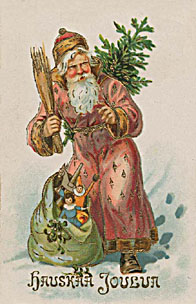

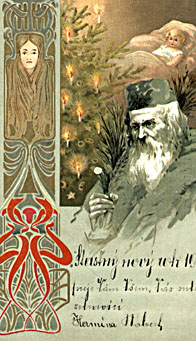



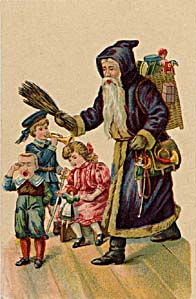

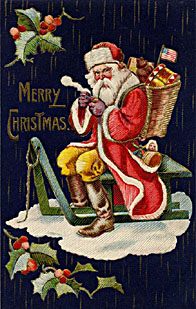



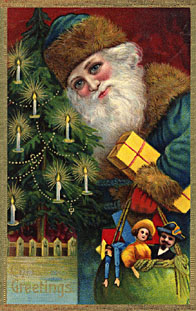

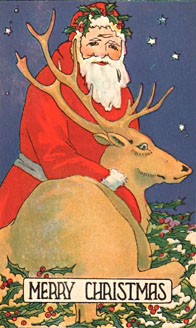

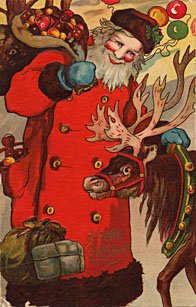

|
POEMS OF MOORE AND LIVINGSTON:
You don't have to be a Don Foster or a Mac Jackson
to have an opinion about the authorship of "Night Before Christmas."
Read Henry.
Read Moore.
Then read
the Christmas poem again and YOU decide who YOU think was the author!
In 1844, Moore published "Poems." Besides the Christmas poem, there is only one other poem in the book with the same rhyme scheme,
but the tone of that poem is completely different.
"Well, said, master Dunghill," cried Pig in a rage,
"You're doubtless, the prettiest beau of the age,
With those sweet modest eyes staring out of your head,
And those lumps of raw flesh, all so bloody and red.
Mighty graceful you look with those beautiful legs,
Like a squash or a pumpkin on two wooden pegs.
And you've special good reason your own life to vaunt,
And the pleasures of others with insult to taunt;
Among crackling fools, always clucking or crowing,
And looking up this way and that way, so knowing,
And strutting and swelling, or stretching a wing,
To make you admired by each silly thing;
and so full of your own precious self, all the time,
That you think common courtesy almost a crime;
As if all the world was on the look out
To see a young rooster go scratching about."
The Pig and the Rooster
As the only child of the Episcopal bishop of New York, Moore must have tried to be the 'perfect son.' When invited to a ball, he wrote:
Nor let these warnings, by your Guardian giv'n,
By winning pleasure from your thoughts be driv'n.
For if, regardless of my friendly voice,
In Fashion's gaudy scenes your heart rejoice,
Dire punishments shall fall upon your head:
Disgust, and fretfulness, and secret dread.
Invitation to a Ball
It was amazing how many ordinary parts of life Moore was able to turn into morality lessons. And heavy-handed ones, at that.
Come children dear, and look around;
 Behold how soft and light Behold how soft and light
The silent snow had glad the ground
 In robes of purest white. In robes of purest white.
...
But see, my darlings, while we stay
 And gaze with fond delight, And gaze with fond delight,
The fairy scene soon fades away,
 And mocks our raptur'd sight. And mocks our raptur'd sight.
And let this fleeting vision teach
 A truth you soon must know -- A truth you soon must know --
That all the joys we here can reach
 Are transient as the snow. Are transient as the snow.
Lines Written After a Snow-storm
His self-opinion could not be termed "humble."
Some few, who would philosophers be deem'd,
At what is sacred aim'd their heartless wit;
Whose wanton sallies, to the pious, seem'd
The pale cold light which putrid things emit.
From such, our Henry never turn'd aside,
When aught they said was to his ear address'd;
But, by superior lore, abased their pride;
Or, by his keen reproof, their levity repress'd.
He made them know and feel that, in his eyes,
The humblest pauper who could hope and pray,
With heart sincere, above this state to rise,
Was of a higher, nobler caste than they.
Saratoga Part 5
Moore did, indeed, write Christmas poems. This one, in his own handwriting, was written in 1822, the year before
"Night Before Christmas" was first published. And it's in the same rhyme scheme as NBC, but not quite the same
light-hearted joie de vivre.
But, speaking of crying, I'm sorry to say
Your screeches and screams, so loud ev'ry day,
Were near driving me and my goodies away.
Good children I always give good things in plenty;
How sad to have left your stocking quite empty:
From St. Nicholas
For The First Time Ever, you'll be able to read a transcription of
Moore's handwritten, manuscript book of poems
written after his book was published. The first 94 page poem, finished in 1951, 12 years before Moore's death,
describes the devil trying to get the soul of a new born child. Still a bit of a stiff, it would seem.
"Fie, George! speak not with mockery of prayer;
"Nor treat things sacred with unholy mirth.
"Thy prayers, I fear, go not beyond the wish
"For feast and dance and song and revelry.
"But fancy not, this day's religious rite
"A festival for Pleasure's idle crew.
"Sir Charles would deem wild gaiety unmeet
"To mark the entrance on the christian state.
"And let not want of reverence appear
"In word or look, I do beseech thee, George;
"For, through all kindness, this unruly prank
"Will fill thy guardian's mind with painful thoughts.
"And, to unwonted harshness nought so apt
"To rouse the even tenor of his mind
"As youthful arrogance that dares pronounce
"On themes that pass an angel's intellect."
Charles Elphinstone
Henry's poetry is looser than Moore's in structure, and it is joyful. He has the most simple faith in God,
and it gets him through every trial.
Without distinction, fame, or note
Upon the tide of life I float,
A bubble almost lost to sight
As cobweb frail, as vapor light;
And yet within that bubble lies
A spark of life which never dies.
He doesn't make fun of people. He laughs with them.
And I have been told (though I must disbelieve
For the tidings as fact, I would never receive)
That billets of cork have supplied the place
Of something the Fair-ones imagine a grace;
But whether 'tis placed behind or before;
The shoulders to swell, or the bosom to shoar
To raise a false wen or expand a false bump
Project a false hip or protrude a false rump,
Was never ascertain'd; and fegs I declare
To make more enquiry I never will dare.
Acknowledgment
He does make moral points, but he does it so gently that you don't even taste the medicine as it slips down. Midas was written the year before Henry died, when he was 78.
Affrighted now, the bell he found;
'Twas turned to gold, and could not sound.
His guards attended to his call
And rush'd en-masse into the hall
A well appointed martial band -
- He seized their leader by the hand
And beg'd assistance - But behold
The gallant captain turn'd to gold.
Midas
And as with "Night Before Christmas," Henry can get into the mind of a child and create images of the world the child wants, not the world the
adult wants for the child.
Never may thy wicket ball
In a well or puddle fall;
Or thy wild ambitious kite
O'er the Elm's thick foliage light.
When on bended knee thou sittest
And the mark in fancy hittest
May thy marble truly trace
Where thy wishes mark'd the place.
If at hide and seek you play,
All involved in the hay
Titt'ring hear the joyful sound
"Timmy never can be found."
Timmy
All Moore's Poetry,
All Henry's Poetry
Many Ways to Read Henry's Poetry
Comic Book Poetry
Arguments on Authorship
|
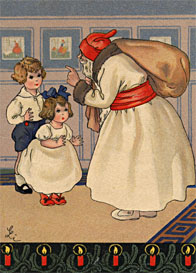
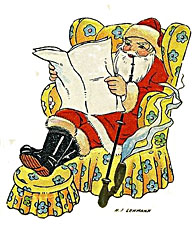
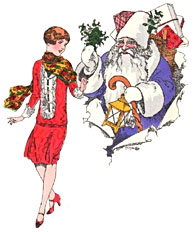
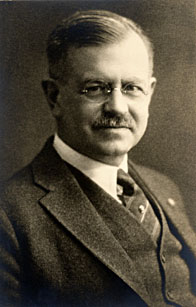
William S. Thomas

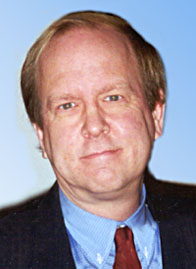
Stephen Livingston Thomas
|
THE WITNESSES:
Because Henry's descendants were determined to eventually prove his authorship, they kept and passed on every scrap they could find belonging to, or
relating to, Henry. Additionally, because many of Henry's relatives were famous enough to have
their papers kept in archives, we have material on Henry in various archives. The information includes that:
Three of Henry's
children and one daughter-in-law remembered Henry reading the poem to them almost 20 years before the poem was first published in the Troy Sentinel in 1823.
An original, corrected manuscript and original publication had been found in Henry's desk.
The manuscript was first inherited by son Sidney, then by son Edwin, who lost it in a house fire around 1857.
The printed poem was inherited by son Charles, then by his daughter Jane, from whose desk it disappeared.
As to the poem passing to the Moore household, the children remembered a guest,
who might have been a governess by profession, who was visiting the family one season when Henry was reading the poem and asked for a copy. The lady was then
traveling to the south, possibly to take a position with a Moore family, and was passing through the home of Clement Moore on her way. No date given.
Later
investigation discovered that Henry's 1st cousin Judith Livingston, who lived next door to him, was married to John Moore, a relative of
Clement Moore's father's family. Judith and John's daughter
Lydia married a Clement Moore associate, Rev. William Hart, and moved to Virginia. Lydia's daughter Frances married Rev. Clement Moore Butler,
the brother of Harriet Butler, the young woman who gave the poem to the Troy Sentinel.
THE QUEST TO PROVE HENRY'S AUTHORSHIP:
It was the women who first tried to prove Henry's authorship. In 1879 they began sharing letters and stories to pool together information
from the various lines of Henry's children.
William S. Thomas was the first descendant to have enough information collected to lay the family's case before the public,
inspiring an article by James Thurber in 1927.
W Stephen Thomas continued the descendants' quest and inspired Vassar President Henry Noble MacCracken in 1958 and
Tristram Potter Coffin in 1973 to come down on Henry's side. In 1977, Fleetwood came out with
a First Day Cover referencing the fact that Henry's authorship had come to be accepted by scholars. And yet these
testimonials, too, disappeared under the weight of editions of the Christmas poem published in Moore's name.
in 1999, I convinced Vassar professor Don Foster to take up the research into the authorship of the poem, with my cousin
Stephen Livingston
Thomas generously making the descendants' collection available. In 2000, Don came out with a chapter of his book
Author Unknown, devoted to the controversy and finding the weight of argument in Henry's favor.
Today the researcher is Mac Jackson, whose statistical analysis is currently tilting also toward Henry.
The People of the Quest,
Historical Articles,
Articles Both Pro and Con
Witnesses,
Timeline of Witnesses
|
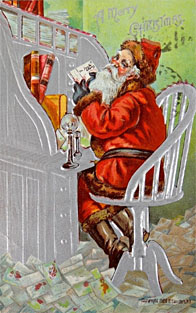
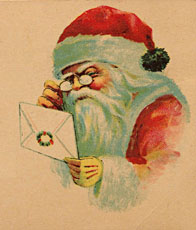
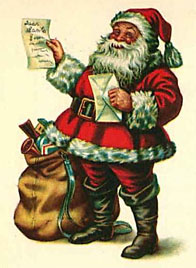
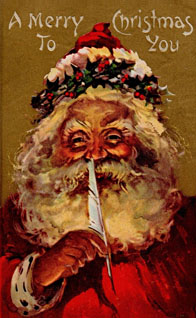
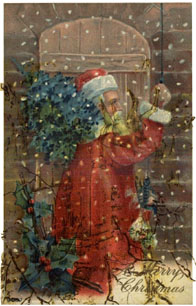
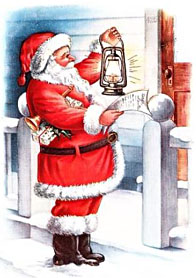
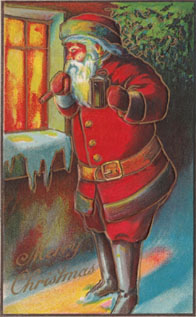
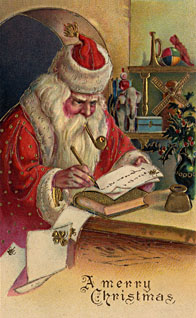
|
WRITING:
Henry's letters to family and friends are a volcano of joy and curiosity and love. And, as NJ Gov. Livingston's daughter
Susannah wrote to her sister, John Jay's wife Sarah, the lava was voluminous.
"William sent 2 long epistles about a fortnight ago, to Philadelphia for Harry; he has
at last broke bulk..." He supports their dreams, and is proud of them, offering advice, and seeing in them a source of fascinating
information.
LETTERS:
Go on my beloved descendant to improve your mind-- confirm your morals & increase in Religious aspirations.
My fond wishes look forward to a day, not far distant when you will conspicously appear in the front rank
of the first & best citizens of Illinois. ...
When wells are dug at what depth is water found? When procured is it cold & pure, brackish or otherwise.
Are field enclosures of wood, hedge, stone, or earth. Is winter wheat & rye grown-- if so, how many bushels to the acre.
The month & day of the month when Indian corn ought to be planted. The number of bushels (shelled) to the acre?
Can the stock swine get their livings in Winter without being fed from the grainery? Are cows & horses cheaply wintered?
I go on to torment you. Suppose this 6 miles square of land carried 20 miles east of the Mississippi. Then what would the proportion of prairie be to the upland.
To Grandson Sidney, 1819
I felicitate you on your legal diploma. That you will soon be an HONEST lawyer I am confident. I hope & believe you will be a great one.
Study hard my son, but think more. To be a compleat Jurist is a sublime character. ...
The Missouri slave question agitates every body here. Happy Illinois! Thine is exclusively the land of the FREE.
To Grandson Sidney, 1820, U.S. Senator from Illinois,
Chief Justice Illinois Supreme Court
Your last of 22d ult. came to hand the 2d instant. The sunshine which irradiated this & Eliza's letter reflected its gleam on all our faces.
Go on, my boy, and prosper. You have industry and talent and integrity and if heaven blesses you with health and protracted existence honors
and wealth will follow. In due time you will form an item in your state legislature. To this I have no great objection. But beware of Congress:
never consent to go there, except your fortune becomes tip-top-i-cal. While in active business you can never afford to spend half your time in Washington.
To Son Charles, 1826
Henry didn't just collect all of this information, he put it to use. Once a year he would write a Carriers' Address, which was a New Years broadsheet
that newsboys (who might be in their 50's) would carry with them and give subscribers with the expectation of getting a yearly tip in return. These were
very long and Henry's, unlike many other such addresses, would playfully change rhythm as he went, shifting between a recap of the year's news
and more personal expressions.
CARRIER ADDRESSES:
Tho suns shine clear, or tempests growl,
Mild zephyrs fan or whirlwinds howl;
Tho cold snows fly, or hailstones rattle
And ev'ry element's in battle:
Thro thick and thin and thin and thick
Go flound'ring on poor George and Dick!
Nor care a button for disasters
So you're contented gentle masters.
And now the end of all this clatter
Is but a small and trifling matter;
A puny six pence or a shilling
From willing souls to souls as willing.
1787 Poughkeepsie Journal
To the regions of Pluto, and banks of the Styx,
Last night took its flight Eighteen hundred and Six,
And Time, with his sceptre, this morning has driven,
Its place to supply, Eighteen Hundred and Seven!
And thus while the seasons and months roll away,
And empires and kingdoms increase and decay,
Pray what of the world's passing scenes could you guess,
Were it not for the sheets which we send from our press?
1807 Political Barometer
My greetings well over -- let's light our cigars
And talk of Europa, its squabbles and wars.
In the front rank of carnage conspicuous is seen
That scourge of mankind the accurst Napoleon;
Like a comet erratic he shines but to burn,
From the glare of his splendour palid virtue must turn;
The nations around him submissively bend,
Look pale at his frown and each mandate attend.
Great Britain alone has the javelin hurl'd,
Stop't the torrent of death, and kep't Hope in the world;
May her arm energetic, grow stronger and stronger,
Till the Demon of Corsica rages no longer.
1811 Poughkeepsie Journal
Believe me, dear patrons, I have wand'red too far,
Without any compass, or planet or star;
My dear native village I scarcely can see
So I'll hie to my hive like the tempest-tost bee.
Hail home! sacred home! to my soul ever dear;
Abroad may be wonders but rapture is here.
My future ambition will never soar higher
Than the clean brushed hearth and convivial fire;
Here I lounge at my pleasure, and bask at my ease,
Full readily sooth'd, and desirous to please,
As happy myself as I happy can be,
I wish all the circle as happy as me.
But hark what a clatter! the Jolly bells ringing,
The lads and the lasses so jovially singing,
Tis New-Years they shout and then haul me along
In the midst of their merry-make Juvenile throng;
But I burst from their grasp: unforgetful of duty
To first pay obeisence to wisdom and Beauty,
My conscience and int'rest unite to command it,
And you, my kind PATRONS, deserve & demand it.
On your patience to trespass no longer I dare,
So bowing, I wish you a HAPPY NEW YEAR.
1819 Poughkeepsie Journal
Anyone remember someone finding the trunks of Dr. John Watson in the attic and using those "notes" to
write a new Sherlock Holmes pastiche? Long before that, in 1793, Henry describes finding something in his.
25th. Seven o'clock. Well, the farce is over, and we Invincible Macedonians have got the Granicus in our rear! My opponent behaved pretty well;
although he ought to have pretended resistence a little longer than he did. I believe the rascal thought more than once that we were in earnest.
I will give one of the half starved poets that hang upon me, a pistareen and mug of grog, to describe this days' bustling as a battle of
amazing magnitude: Paint Bucephalus as plunging thro' the foaming current, and bearing me resistless at the head of thirty thousand veterans
on a foe, valiant, tho' unequal -- describe the eagle of victory hovering over my helmet -- and the Fates fainting on the shore. The fools of
posterity perhaps may read the nonsense and believe it.
War Journal of Alexander the Great
Then there's the poem from the point of view
of a lump of gold in the ground. Or the prose piece from the point of view of a pine tree.
Henry frequently leaves your tongue stuck in your cheek so long, you worry it's going to stay there. Never fear. Laughing loosens the
tackiest tongues.
Henry's Writing,
Prose,
Letters
All Henry's Poetry,
Many Ways to Read Henry's Poetry
Carrier Address Examples,
1791 NY Magazine
|
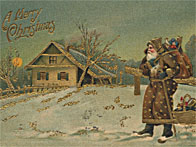
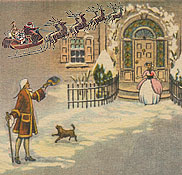
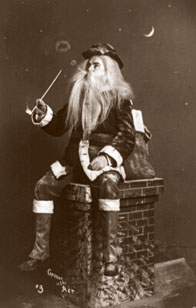

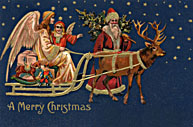
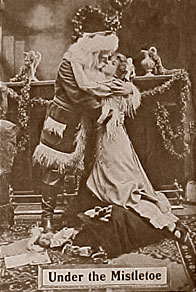
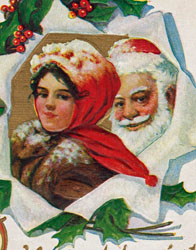
|
THE MAN:
Henry Livingston, the third child of his family, was born in Poughkeepsie NY in 1748. His father was well-to-do for Poughkeepsie, though not for
the larger Livingston clan. Chauncey Graham, a Presbyterian minister in nearby Fishkill, educated the boys, although Henry's older brother John Henry
was taken out early and prepared for early admittance to Yale University at age 12, graduating at 16. Henry's writing shows clearly a wide and
deep classical education as a product of his ceaseless curiosity. But a profession like those of his brothers or his
well known relatives, was not in Henry's plans. For
Henry, it was all about the land.
By the side of a murmuring stream,
 Where willows the margin imbrown; Where willows the margin imbrown;
We'll wander, unheeded, unseen,
 Nor envy the taste of the town. Nor envy the taste of the town.
In scenes, where confusion and noise
 And riots loud voice is unknown; And riots loud voice is unknown;
We'll humbly participate joys,
 That ever from greatness have flown. That ever from greatness have flown.
Let avarice smile o'er its gain,
 Ambition exult at its height, Ambition exult at its height,
Dissipation unloose every rein,
 In pursuit of forbidden delight. In pursuit of forbidden delight.
We'll cling to our cottage, my love,
 There a meeting with bliss we ensure. There a meeting with bliss we ensure.
The Seraphs who carol above
 Must smile on enjoyments so pure. Must smile on enjoyments so pure.
Invitation to the Country
Helen Wilkinson Reynolds, a Dutchess County historian, said of Henry:
"The versatility of Henry Livingston, Jr., cannot be taken as typical of most men in the community in which he lived.
Such varied accomplishments as he possessed are rarely found at any time or in any place centered in an individual.
But his standards in art and literature, the social customs outlined in his writings; his industry and business acumen
may all, with fairness, be taken as the measure of such things locally in his day."
The culture of Poughkeepsie was New York Dutch, although that was starting to change. His mother's family, the Conklins, were heavily Dutch and
Henry's descendants mention that one of Henry's favorite expressions was the Dutch oath, "Dunder and Blixem!"
Henry's grandfathers, father and brothers were Elders and Deacons in the Dutch Reformed Church and Henry, himself, was a Deacon.
Brother John Henry became a famous minister, as well as President of Rutgers.
Religion was the rock on which Henry built his life, and it was his refuge when he lost his adored, first wife Sarah, the daughter of
Yale-educated Congregational minister Noah Welles.
I LOVE my feeble voice to raise
In humble pray'r and ardent praise
Till my rapt soul attains that height
When all is glory and delight. ...
I LOVE to join the pious few
And there the covenant renew,
Recount our joys, relate our grief
And jointly ask from GOD relief.
I LOVE on Pity's wing to fly
To sooth the deep expiring sigh,
To wipe the tear from wan distress
And light a smile on Sorrow's face.
I LOVE to view domestic bliss
Bound with the ligature of peace,
Where Parents - Children - All agree
To tune the lute of harmony.
I LOVE the morning's roseate ray,
I bless the glorious march of day,
And when the lulling ev'ning comes
I love the night amidst its glooms.
I LOVE to anticipate the day
When the freed spirit wings its way
To the Jerusalem above
Where reigns 'th eternal SOURCE of LOVE.
God is Love
Ten years after Sarah died, Henry married Jane Patterson, who filled his home with a new flock of children just as daughter Catharine, now married to
Arthur Breese, was filling hers with Henry's grandchildren. It was for this second family that Henry wrote The Night Before Christmas.
Henry died 29 Feb 1828, and few obituaries so well describe a man.
DIED - At his residence in this town, on Friday the 29th ult. HENRY LIVINGSTON, ESQ. in the 80th year of his age. In him we have lost another soldier
of the revolution, a patriot, and asserter of American Independence. In 1775, he accompanied the American force to Canada, as Major of a regiment
commanded by Col. James Clinton. (Afterwards general) and father of his Excellency De Witt Clinton, late Governor of the state of New York.
He subsequently sustained the office of a Judge in this county, and his social qualities were of a high order. He was a great lover of the
fine arts, and particularly fond of poetry and painting. His best qualities, however, shone in the domestic circle, over which his tender
feelings, his warm affections, and his sprightly and instructive conversation, shed uncommon interest and loveliness,
till within a short period of his departure. This will cause his loss to be long felt and deeply deplored by his bereaved consort and children,
although he was spared to a good old age, and died in the Christian's hope, without a struggle or a groan.
The Man,
About Henry,
Timeline and Events,
Owners of Locust Grove
Book:
Sarah Welles,
Jane Patterson,
Knowledge,
NY Dutch,
Religion
Slideshow:
Sarah Welles,
Jane Patterson,
Knowledge,
NY Dutch,
Religion
|
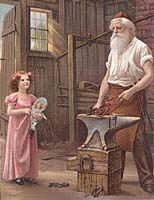
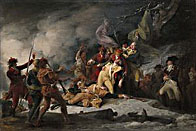
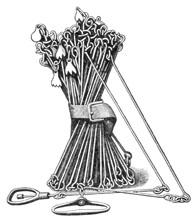
|
WORK:
Henry was first a farmer. From his Day Book, we can see the wide range of activities on his land.
1772 Apr 03 - Planted out 34 Apple & 5 Locust trees
1772 Jun 19 - Bought of John Freer the Bull that was Gilberts
1773 Apr 19 - John Schenk Dr to 7 Bus. potatoes
1773 Dec 14 - Gave J. N. Bunschoten a Calf for a sheep
1775 Feb 09 - R North £7 for 20 bus of wheat he carried down for me
After the first shots were fired in Boston in April 1775, Henry took a commission
as Major of the 3rd New York, traveling north in the invasion of Canada.
Having had to leave his newborn daughter to take up his post, Henry chose to return home when his six month enlistment was up, after they had captured Montreal.
Henry kept a journal, which records just how democratic this Revolutionary Army was.
October ll.- When the General recommended building a Battery west of the forts of St. John But the motion was unanimously opposed
by the Officers who were of the opinion as one man, that a Battery erected on the east side of the lake opposite the Forts would
make a greater impression on our enemys. On that points being carried the General Ordered Coll'o Clinton and 200 of his men to go
upon that Business. The Col'o pitch'd upon myself to go with him.
When his Revolutionary War service ended, Major Henry received
the political appointment of Commissioner of Sequestration, responsible for confiscating, appraising, and selling or renting
the property of Loyalists. He was later Principle Assessor, Coroner, and Justice of the Peace.
Through his surveying experience, Judge Henry also picked up other jobs, becoming land agent for John Jacob Astor's suit
against NY state. Henry also became Supervisor of the Post Road Turnpike that passed by his property.
Farmer,
Surveyor,
Political Positions,
Judge
Book:
Major,
Political Offices,
Farmer
Slideshow:
Major,
Political Offices,
Farmer
|
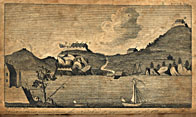
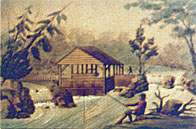
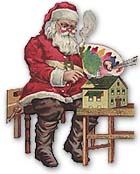
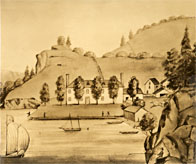
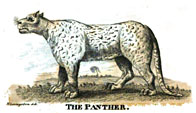
|
ILLUSTRATIONS:
HEAR THE POEM TO ANTIQUE ILLUSTRATIONS:
Listen to The Trail Band reciting Night Before Christmas while watching images from my collection of
antique illustrations.
Read an illustrated 1823 version of Night Before Christmas to your family.
POSTCARDS:
The Santas in these postcards differ somewhat from the ones we see
today in that they often show the nasty side of Santa.
ANTIQUE ILLUSTRATED EDITIONS:
While Christmas has always been a favorite subject of artists, A Visit From St. Nicholas has been
absolutely inspirational.
HENRY'S:
When Henry wasn't writing funny little poems or prose pieces, he was drawing. In watercolors, Henry's work is primitive with respect to people, but
right on when it came to birds and animals. He would use these drawings to illuminate the maps that
accompanied his surveys. But when Henry's art was transformed into etchings for publication, they
stiffened into the rigid drawings so common in magazine illustrations of the time.
Postcards,
Maps,
Watercolors,
Published Engravings,
A Moving Collage of Images
|


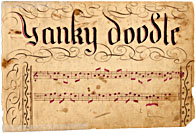
|
MUSIC:
Besides a manuscript book of his original poems, Henry left behind a 207 page music manuscript book of the popular
songs and hymns of the period, copied from publications and from other local manuscript books. Thanks to the book's
inheritor, Stephen Livingston Thomas, that manuscript and other documents were made available for research from The Thomas Collection.
It's in this book that Don found songs from John O'Keefe, a writer whose use of "snug" is identified as one of the
Christmas poet's literary influences.
A favorite source of Henry's is Sheridan's The Duenna.
Many of the hymn and psalms lyrics in Henry's manuscript book appear later in his brother John Henry's book of Psalms and
Hymns. There are some anonymous hymns in John Henry's book that have been loosely attributed to "Livingston." This
looks to be a fruitful future research area for those interested in both Henry and John Henry.
|
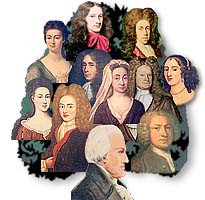
|
GENEALOGY and BIOGRAPHIES:
Until I started researching Henry's genealogy for Don, as an tool to find other research materials, I never
realized how sexist genealogy actually is! Professors of history tend to get lazy and make use of the books of
genealogists. Genealogists tend to be descendants who want to leave behind the history of their surname. So when
you get into a family book, it traces all the male descendants, but stops as soon as a daughter marries out of the name.
Then you get the historian coming in and making conclusions about the descendants of someone when, in actuality, they're
making conclusions about the MALE descendants of that person. Luckily, there aren't any sexists here in Henry Land,
so you're going to be perfectly happy to recognize that famous descendants of Henry's grandfather Gilbert include
Livingstons like Rev. John Henry Livingston, but also other people of other surnames like
Governor Hamilton Fish,
General Melancthon Taylor Woolsey,
Lt. Governor Pierre Van Cortlandt,
General Philip Van Cortlandt,
Lt. Governor Stephen Van Rensselaer,
Mayor Philip Schuyler Van Rensselaer and
Presidents George Bush!
Henry's direct descendants include
General Henry Livingston Lansing,
General Henry Seymour Lansing and
Robert L. Denig Sr and Jr;
Illinois Chief Justice and Senator Sidney Breese;
Senator Elisha Kane;
Archdeacon William Reed Thomas and
Admiral Samuel Livingston Breese.
Women of the family - like Patricia Morse McNeely - are just beginning to get their due.
Prominent Relatives
Biographies
Descendants of Robert,
Henry's Place in the Family,
Portraits
|
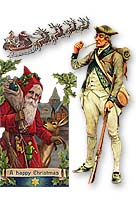
|
HISTORY:
When news of the Battle of Bunker Hill hit New York, Henry joined his cousin Janet's husband, General Richard Montgomery, in his expedition to invade Canada.
Henry was Major of the newly formed 3rd New York, under the
immediate command of Colonel James Clinton, the brother of Governor George Clinton and father of Governor
DeWitt Clinton. Years
later, Henry would reuse the style of his war journal in a humorous sendup of a newly found journal of Alexander the Great.
Henry's Journal,
Journal of Alexander the Great,
Washington Inauguration,
Erie Canal,
Clermont,
Lafayette
|
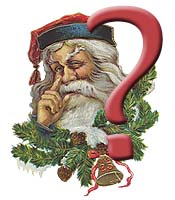
|
GAMES:
We have to admit that we can't solve the quizzes that Henry wrote in
his own poems - his rebuses. The only rebus for which we have a solution
is one we have from Dutchess County Historian Helen Wilkinson Reynolds.
So we've come up with a way to let YOU help! We've turned Henry's rebus
poems into games of Hangman.
We've answered some of the lines, and you can send us the ones you think you've solved, or correct the ones
we've gotten wrong.
In case you're not sure how a rebus works, we've included two brand new ones
(Rebus 1, Rebus 2)
that will solve to pop culture answers.
Good luck, Henry Researchers!
Picture Quiz,
Puzzle Quiz,
Rebus Quiz
|
